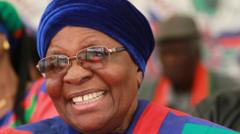At 72 years old, Netumbo Nandi-Ndaitwah has emerged victorious in Namibia's presidential election, clinching over 57% of the vote. This landmark achievement makes her the country's first female president, a significant milestone in Namibian history. Nandi-Ndaitwah, affectionately known as NNN, has dedicated her life to the liberation of Namibia from oppressive powers, beginning her journey at the young age of 14 when she joined the South West Africa People's Organization (Swapo). Throughout her political career, she has occupied influential positions, including ministerial roles focused on foreign affairs, tourism, and child welfare, while championing women's rights, most notably through the Combating of Domestic Violence Act in 2002. However, her election has not been without controversy; her main opponent, Panduleni Itula, claims the election process was flawed and is preparing to contest the results legally. Despite the challenges ahead, Nandi-Ndaitwah vows to steer Namibia towards economic transformation as she steps into her new role.
From Resistance to Leadership: Netumbo Nandi-Ndaitwah Makes History as Namibia's First Female Leader

From Resistance to Leadership: Netumbo Nandi-Ndaitwah Makes History as Namibia's First Female Leader
Netumbo Nandi-Ndaitwah has shattered glass ceilings by becoming Namibia's inaugural female president, armed conflict survivor, and seasoned political warrior.
As the country celebrates this historic victory, Nandi-Ndaitwah's extensive background in activism and governance showcases her commitment to leading Namibia with integrity and impactful policies.
Born in 1952 in the northern region of Onamutai, Nandi-Ndaitwah's roots in activism began early, as she opposed the South African occupation of Namibia. Joining Swapo as a teenager, she quickly became a prominent voice within the party, eventually seeking refuge in Zambia and Tanzania amidst political turmoil. Her education in the UK helped solidify her expertise in international relations and refined her vision for a liberated Namibia. After the country gained independence in 1988, Nandi-Ndaitwah returned to contribute to the government, holding various significant positions over the years. Known for her practical approach, Nandi-Ndaitwah promotes action over rhetoric, stating, "I am an implementer, not a storyteller."
Nandi-Ndaitwah's tenure is set to influence not only the political landscape of Namibia but also inspire future generations to break barriers and engage in governance and leadership. With a strong foundation of experience and unwavering resolve, she embraces the challenges ahead, firmly positioning herself as an integral part of Namibia's ongoing journey of progress and equality.
Born in 1952 in the northern region of Onamutai, Nandi-Ndaitwah's roots in activism began early, as she opposed the South African occupation of Namibia. Joining Swapo as a teenager, she quickly became a prominent voice within the party, eventually seeking refuge in Zambia and Tanzania amidst political turmoil. Her education in the UK helped solidify her expertise in international relations and refined her vision for a liberated Namibia. After the country gained independence in 1988, Nandi-Ndaitwah returned to contribute to the government, holding various significant positions over the years. Known for her practical approach, Nandi-Ndaitwah promotes action over rhetoric, stating, "I am an implementer, not a storyteller."
Nandi-Ndaitwah's tenure is set to influence not only the political landscape of Namibia but also inspire future generations to break barriers and engage in governance and leadership. With a strong foundation of experience and unwavering resolve, she embraces the challenges ahead, firmly positioning herself as an integral part of Namibia's ongoing journey of progress and equality.




















